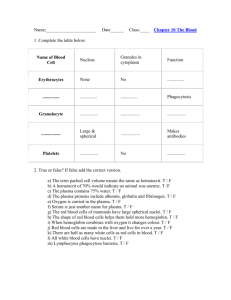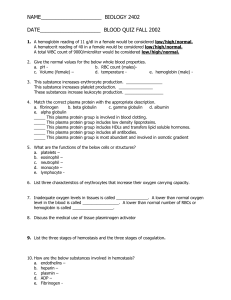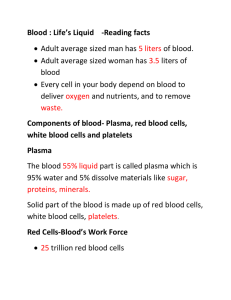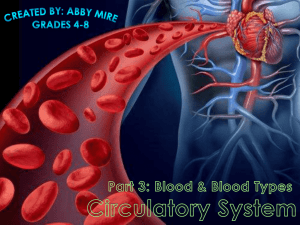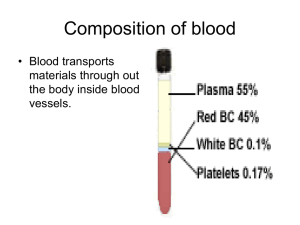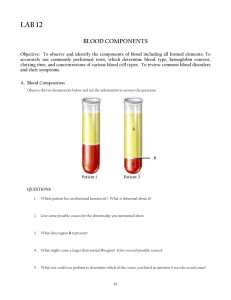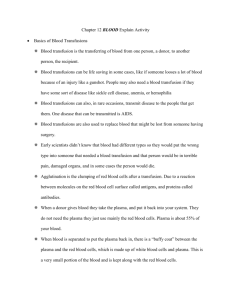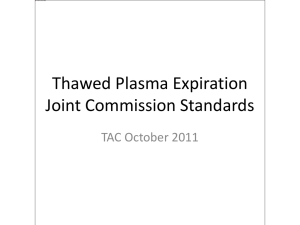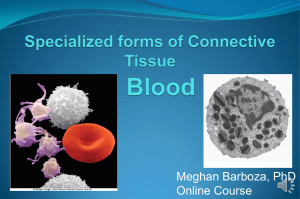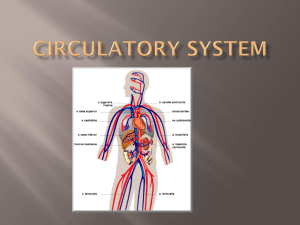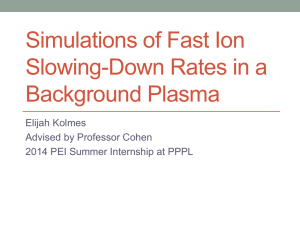Blood Composition Key
advertisement
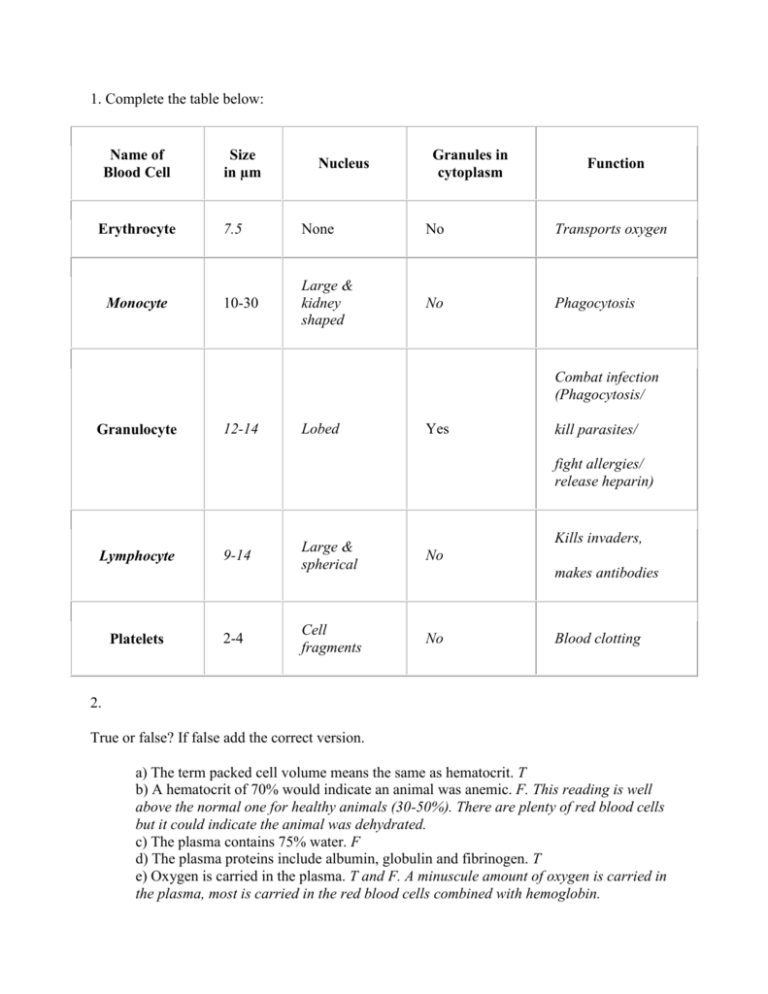
1. Complete the table below: Name of Blood Cell Erythrocyte Monocyte Size in µm Nucleus Granules in cytoplasm Function 7.5 None No Transports oxygen 10-30 Large & kidney shaped No Phagocytosis Combat infection (Phagocytosis/ Granulocyte 12-14 Lobed Yes kill parasites/ fight allergies/ release heparin) Lymphocyte Platelets 9-14 2-4 Kills invaders, Large & spherical No Cell fragments No makes antibodies Blood clotting 2. True or false? If false add the correct version. a) The term packed cell volume means the same as hematocrit. T b) A hematocrit of 70% would indicate an animal was anemic. F. This reading is well above the normal one for healthy animals (30-50%). There are plenty of red blood cells but it could indicate the animal was dehydrated. c) The plasma contains 75% water. F d) The plasma proteins include albumin, globulin and fibrinogen. T e) Oxygen is carried in the plasma. T and F. A minuscule amount of oxygen is carried in the plasma, most is carried in the red blood cells combined with hemoglobin. f) Serum is just another name for plasma. F. There are similar but different. Plasma is the fluid in which the blood cells float in whole blood. Serum is the fluid left after blood has clotted. so it is like plasma but minus the clotting factors Ex. fibrinogen. g) The red blood cells of mammals have large spherical nuclei. F. But the red blood cells of frogs, birds and reptiles do have nuclei. h) The shape of red blood cells helps them hold more hemoglobin. F The lack of a nucleus helps red blood cells hold more hemoglobin. The shape is probably more useful for allowing oxygen to diffuse into them and allowing them to fold up as they pass along extra narrow capillaries. i) When hemoglobin combines with oxygen it changes color. T. it goes from a purple blue color to a cherry red color. j) Red blood cells are made in the liver and live for over a year. F. RBCs are made in the bone marrow and live about 120 days. k) There are half as many white cells as red cells in blood. F. There is only one white cell to every 1000 RBC’S. l) All white blood cells have nuclei. T m) Lymphocytes phagocytosis bacteria. F. No phagocytosis is the job of granulocytes and monocytes. Lymphocytes kill microorganisms in a different way. Some attach and kill them directly others produce antibodies that circulate in the blood and kill them. 3. Identify the blood cells illustrated below. Chose from the following: erythrocyte; lymphocyte; monocyte; granulocyte Name of cell A. Granulocyte B. Monocyte C. Granulocyte D. Lymphocyte E. Erythrocyte (red blood cell) 4. Match the blood cell with the correct function/description. lymphocyte; granulocyte; erythrocyte; monocyte a) Makes antibodies. Lymphocyte b) Carries oxygen. Erythrocyte c) Largest blood cell. Monocyte d) Granules in cytoplasm, engulfs bacteria. Granulocyte 5. This is NOT a function of blood. a) Transporting carbon dioxide to the lungs b) Transporting heat around the body c) Protecting the body from infection d) Producing new red blood cells. Red blood cells are made in the bone marrow. e) Transporting water to the cells 6. Match the words given below with the statements a - l. a) Most blood cells are made here. Bone marrow b) A hormone that increases heart rate. Adrenaline c) The pigment in red blood cells that enables them to carry large quantities of oxygen. Hemoglobin d) This mineral is necessary for blood to clot. Calcium e) A protein in the blood that is essential for clotting. Fibrinogen f) This vitamin is needed for blood to clot. Vitamin K g) A major symptom of this condition is the reduction of the amount of hemoglobin in the blood. Anemia h) This plasma protein maintains the osmotic pressure of the blood. Albumin i) Red blood cells. Erythrocytes j) Each hemoglobin molecule contains 4 atoms of this. Iron k) These plasma proteins are antibodies. Globulins l) Most of the carbon dioxide is carried in the blood in this. Plasma
